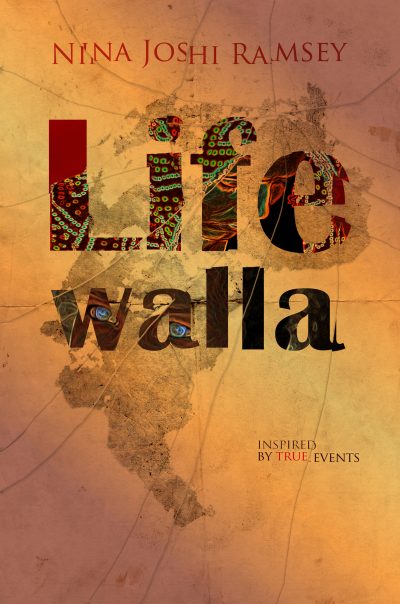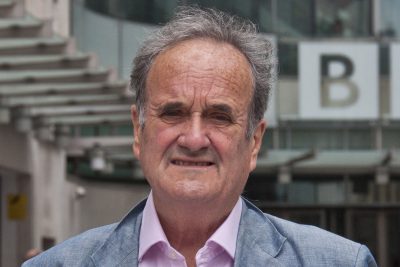
‘Lifewalla’, the debut novel by BMA supporter Nina Joshi Ramsey was released to coincide with the Dussehra festival on 22nd October 2015. Nina had worked hard, raising money for the BMA with a pre-release copy of the book and net proceeds from the UK edition of the print copy are also to our benefit. In a recent conversation with Nina, we discovered that Sir Mark Tully, who will be reading our forthcoming Radio 4 Appeal CLICK, played an instrumental role in the gestation of this fabulous book:
“Writing Lifewalla, which was inspired by the Bhopal gas tragedy, literally seemed to be a journey of fate! In fact, I wasn’t even supposed to be writing it – Over a decade ago, I was struggling to develop a story for a writing class in Greece. My mind went completely blank. Then, all of a sudden, an unlikely, vivid modern-day scene flashed before my eyes. I wrote it in minutes. Although I was petrified reading it out, the response from the class was so fantastic I decided to write a novel around the scene. Unbeknownst to me, a true-life incident of that nature had actually occurred only some years before. Not only had Mark Tully (now Sir Mark Tully) covered it during his tenure as BBC’s South Asia correspondent, he had also written an account of it in his book, ‘No full stops in India.’ Reading my fiancé’s well-thumbed copy, I wanted to visit the village and speak to Tully about the incident. So I booked a flight. Co-incidentally, I was attending a networking session only days after, where we had to prove the theory of 3 degrees of separation by connecting with someone who otherwise seemed out of reach. I was leaving for India in a few days and Mark Tully was still very much out of reach. Fate stepped in.
“I used to head a Technical projects department at Reuters and was co-incidentally having a pub lunch with a Board member who I’d given some presentations with. We’d got on and over the years kept up an informal mentoring relationship. When he found out about my research trip to the village so I could write my novel, he was impressed. My background was in technology and I’d never written a novel before! He asked whether he could help in any way. I was naive and wasn’t sure how he could. By the by we spoke about the networking session and the homework. I hadn’t realised the dots were starting to connect. My mentor used to head up Asia for the company and within a day, he had put me in touch with the Reuters Bureau Chief in New Delhi, who subsequently put me in touch with Mark Tully. We corresponded and set up a visit to Tully’s home in Nizamuddin West in New Delhi. A couple of days later, I was picked up at IGI airport in New Delhi by my sister’s friend. I discovered he literally lived round the corner from Tully. Their dogs were walked around the same local park – Lodhi Gardens. So that might have been plan B! One way of the other it seemed fated.
“At their home, Mark and his partner, Gillian, were gracious hosts and over a beer and nuts, amongst other topics, I drilled down into the story I was writing about. Mark was gracious and generous and shared contacts for other places I could visit whilst I was there, including the groundbreaking Barefoot College. When I asked him which incidents had left a lasting impression during his reporting days, he took some moments before replying. There were a few, including the Bhopal gas tragedy. Something in our conversation resonated deeply and moved me. I had migrated from Kenya to the UK in 1984, the same year as the gas disaster. Around that time many disturbing things had happened in India that seemed only possible in movies. There were similarities to what I had seen in Kenya, with helpless panic and death in the 1982 aftermath of a failed military coup. Something had been stirred in me.
“I completed my planned itinerary in India, but upon my return to London, I spent weeks in the British Library poring over everything I could find on that era in India, including Bhopal. I read reports and newspaper articles the library had. The following year, on holiday in South India, I got an email to meet people in Bhopal, including survivors and a factory worker. I didn’t feel I could develop characters without understanding more about such real life experiences. So my husband and I changed plans and diverted to another city where we stayed overnight to take a 30 hour train journey to Bhopal. Once there, my husband waited in taxis and hotels mostly whilst I spoke to people. When I returned home, I developed a character and city whose backstory was survival from a gas tragedy. Eventually, that character and the city took over and Lifewalla was born, initially as an MA dissertation that achieved a Distinction.
“Since then, it has been another journey for the book, including innumerable challenges in writing and finishing it, finding and losing an agent, getting a publisher who supports the fundraising for clinics in Bhopal, having the book read for the Man Booker Prize. Unfortunately, it did not get long-listed, but we’re still proud of it and the responses readers share.
“I don’t know what the rest of journey holds for the book, but the fate-driven experience so far suggests something interesting could happen. We’ll wait and see. I may still finish that initial story started in Greece that had prompted me to meet with Sir Mark Tully. Had that conversation not stirred something, we may not have a novel now that tells a ‘human story’ whilst raising funds for the clinics supported by the Bhopal Medical Appeal. I have been invited for readings, Q&A’s, a BBC radio interview, guest blogs, etc., and people have told me their lives changed after reading the story; many did their own research afterwards to understand more, which is heartening in itself. How could it not be, and all stemming from that one stirring conversation with Sir Mark Tully that affected the direction I took.”
“At a time when our world is beset by natural and manmade disaster, Nina Joshi Ramsey really gets inside the psychology of disasters and the consequences they wreak. It’s a very human book and the proceeds are for a good cause. I recommend it.” Professor Jamie Hacker Hughes, President 2015-16, British Psychological Society.
Sir Mark Tully’s monologue will be broadcast on our behalf as the Radio 4 Charity Appeal on Sunday August 21 at 07:55 and 21:26 and then, on the following Thursday 25th at 15:27. Please be sure to tune in!




